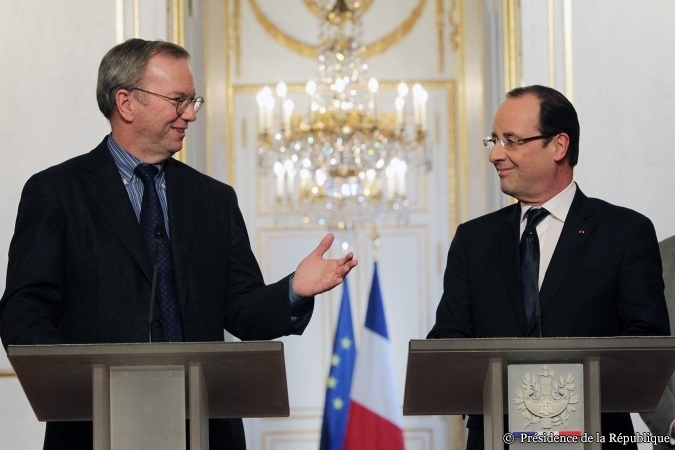…in order to persuade the French to forget about that nasty “link tax” idea. Well, that’s how The Register describes the deal reached by Google Chairman Eric Schmidt and the French President on Friday. Google, unsurprisingly, describes it in more statesmanlike tones: “Google creates €60m Digital Publishing Innovation Fund to support transformative French digital publishing initiatives”.
Of the two, I’m afraid I’m more convinced by the Register‘s interpretation.
Frederic Filloux’s take on it is here. Excerpt:
Dealing with Google requires a mastery of two critical elements: technology (with the associated economics), and the legal aspect. Contractually speaking, it means transparency and enforceability. Let me explain.
Google is a black box. For good and bad reasons, it fiercely protects the algorithms that are key to squeezing money from the internet, sometimes one cent at a time — literally. If Google consents to a cut of, say, advertising revenue derived from a set of contents, the partner can’t really ascertain whether the cut truly reflects the underlying value of the asset jointly created – or not. Understandably, it bothers most of Google’s business partners: they are simply asked to be happy with the monthly payment they get from Google, no questions asked. Specialized lawyers I spoke with told me there are ways to prevent such opacity. While it’s futile to hope Google will lift the veil on its algorithms, inserting an audit clause in every contract can be effective; in practical terms, it means an independent auditor can be appointed to verify specific financial records pertaining to a business deal.
Another key element: From a European perspective, a contract with Google is virtually impossible to enforce. The main reason: Google won’t give up on the Governing Law of a contract that is to be “Litigated exclusively in the Federal or States Courts of Santa Clara County, California”. In other words: Forget about suing Google if things go sour. Your expensive law firm based in Paris, Madrid, or Milan will try to find a correspondent in Silicon Valley, only to be confronted with polite rebuttals: For years now, Google has been parceling out multiples pieces of litigation among local law firms simply to make them unable to litigate against it. Your brave European lawyer will end up finding someone that will ask several hundreds thousands dollars only to prepare but not litigate the case. The only way to prevent this is to put an arbitration clause in every contract. Instead of going before a court of law, the parties agrees to mediate the matter through a private tribunal. Attorneys say it offers multiples advantages: It’s faster, much cheaper, the terms of the settlement are confidential, and it carries the same enforceability as a Court order.

